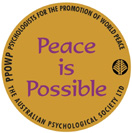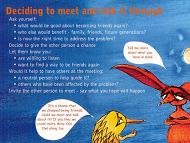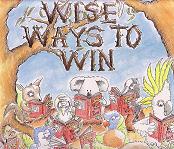Psychologists for Peace
Education Resources
PFP has produced an inspiring selection of educational materials that have been used by children, teachers, parents/carers, schools and communities in learning to solve problems peacefully.
Wise Ways to Win
PfP have released a video version of their children's book Wise Ways to Win, focussing on helping children learn how to resolve conflict cooperatively and creatively.
Free downloadable resources
Orderable Resources
If you would like to order of these resources, please contact Psychologists for Peace via email.
|
|
Range of postersA great range of inspiring, educational and colourful posters |
|
|
'Wise Ways to Win' childrens bookThis childrens book is a fun way for parents, teachers and children to learn about resolving conflicts cooperatively. The story tells how koala and kookaburra avoid a fight and come up with a clever win-win solution that works for everyone. |
 |
'Peace is Possible' badge and stickerWhat we hope for we must firstly believe in.
What we hear influences what we believe. What we believe influences our thoughts and actions. Channelled through the media are constant messages of threat, grief, fear and uncertainty. The world we knew yesterday seems different to the one we know today. Being fearful and defensive in what feels like an unsafe world is a natural human reaction, especially when our world closer to home is threatened. It is normal to want to keep ourselves and those we love safe. People respond differently to perceived threats. Some become passive and withdrawn, others behave aggressively. A better way to cope is to find ways to act constructively. Constructive action involves seeking firstly to understand the origins of a situation and both one's own and other people's views and needs. Constructive action seeks to increase a sense of security by encouraging positive solutions and fostering healing. Psychologists for Peace encourages individuals and communities to foster an alternative dialogue to fear and retribution in this world of uncertainty. |





